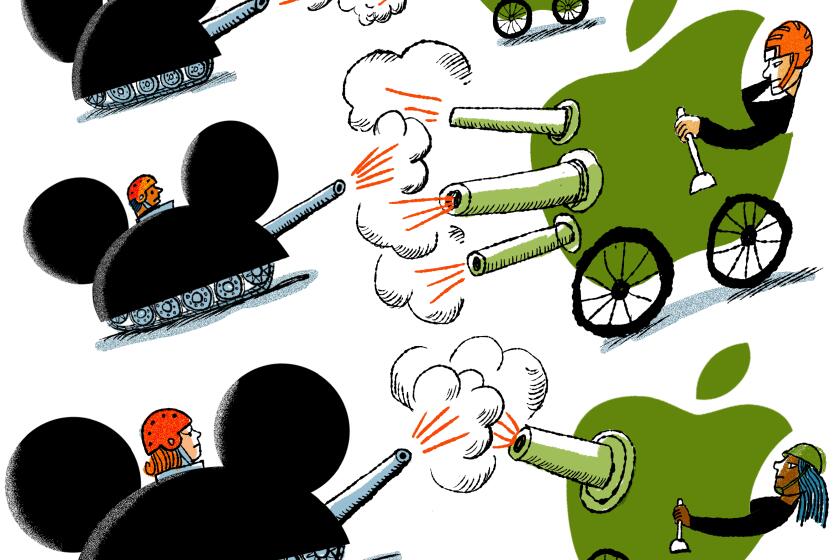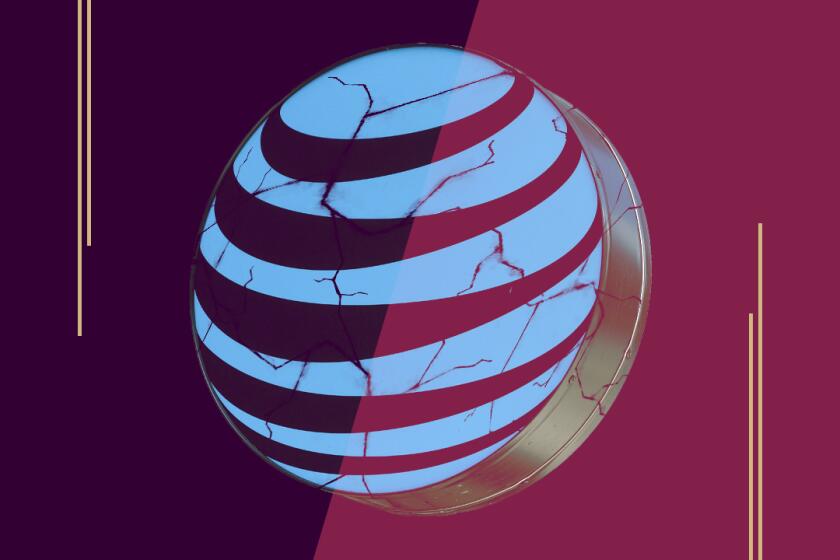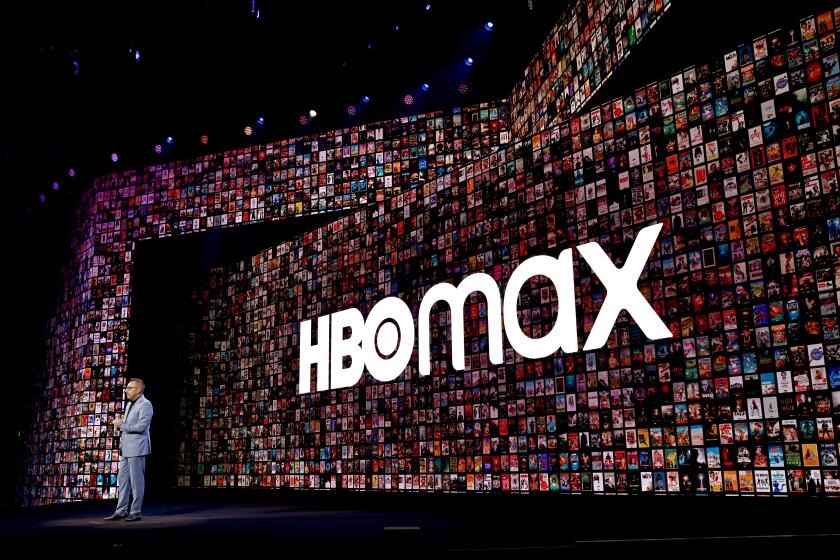Why Amazon buying MGM is a watershed moment for Hollywood and tech

After years of speculation about the merging of Big Tech and Hollywood, Amazon.com Inc. said Wednesday that it is acquiring Metro-Goldwyn-Mayer Studios for $8.45 billion — snapping up a library of more than 4,000 movies and storied franchises including “James Bond,” “Rocky” and “The Pink Panther” — in a watershed moment for the entertainment industry.
The deal, subject to regulatory approval, would be the Seattle online retail giant’s second-largest purchase ever, following its $13.7-billion acquisition of Whole Foods in 2017.
It comes at a pivotal time as competition ramps up among streaming services such as Netflix, Disney+ and HBO Max, where hit shows are key to driving consumers to subscribe. The rapid changes are fueling a wave of consolidation in the media landscape. Just last week, AT&T Inc. said it would spin off WarnerMedia in a $43-billion deal with Discovery, a remarkable retreat for the telecommunications giant only three years after it bought the assets.
For Amazon, the principal attraction is MGM’s valuable library, which includes 17,000 episodes of TV programming and a stable of film properties that could be mined for reboots.
Amazon already has a studio of its own, based in Culver City and run by former NBC executive Jennifer Salke since 2018. It has produced a handful of acclaimed television series, such as “The Marvelous Mrs. Maisel” and “Fleabag,” and has released some popular movies, including “Borat Subsequent Moviefilm.”
The studio, which earlier won awards for such art-house fare as “Manchester by the Sea,” was nominated this year for 12 Oscars with films that included “Sound of Metal,” “Borat” and “One Night in Miami.”
But Amazon’s performance on the big screen has been uneven, and many of its biggest hits were films that it didn’t actually make. For instance, “Coming 2 America,” a big draw for Amazon Prime Video this year, was acquired from ViacomCBS’ Paramount Pictures. And if Amazon wants to stay competitive, it has to ramp up production.
People close to the e-commerce colossus who were not authorized to comment said the MGM acquisition fits Amazon Chief Executive Jeff Bezos’ plan to grow Amazon’s entertainment business more aggressively to better compete against Netflix and others.
“This gives them the opportunity to acquire talent that has a better expertise at creating movies and hits,” said Brian Yarbrough, a consumer research analyst at Edward Jones.
Streamers are eager to build their own libraries of intellectual property for series, as more companies are launching rival platforms instead of selling content to others. Amazon’s acquisition of MGM increases its catalog and gives it a prolific TV production engine. Beverly Hills-based MGM is responsible for shows such as “The Handmaid’s Tale,” “Vikings” and “Fargo.”
“Clearly Amazon is in full throttle in terms of spending on programming,” said Brahm Eiley, president of Convergence Research Group in Victoria, Canada. “That’s the only way that you are going to reduce churn and keep eyeballs on your programming at the end of the day.”
The deal is sure to face criticism from lawmakers already concerned about the size and dominance of Amazon.
The proposed acquisition follows years of speculation that one of the large tech players — Apple, Google, Facebook or Amazon — would buy a studio after either dabbling in entertainment or trying to build their own production pipelines.
Apple, for example, has long been rumored as a buyer for a production company such as A24 or MGM to supercharge its content machine for Apple TV+. But so far the Cupertino, Calif., company has chosen to make or license movies and shows for Apple TV+, such as “Ted Lasso,” produced by Warner Bros. and Universal.
Disney takes on Netflix, as HBO Max, Peacock, Apple TV+ and Quibi prepare to enter the streaming fray. Not all will be able to thrive in the increasingly crowded market, analysts warn.
Instead, it’s Amazon that’s taking the plunge.
Bezos’ decision to step down as chief executive of Amazon this summer led some to question whether the company he founded would retreat from the entertainment business. The billionaire’s replacement, Andy Jassy, currently runs Amazon Web Services, the company’s cloud computing arm, and has little familiarity with Hollywood.
But Amazon recently announced that longtime executive Jeff Blackburn would return to run entertainment and media properties, including Amazon Studios and Prime Video, signaling that Amazon was looking to improve its position.
“The real financial value behind this deal is the treasure trove of IP in the deep catalog that we plan to reimagine and develop together with MGM’s talented team,” Mike Hopkins, senior vice president of Prime Video and Amazon Studios, said in a statement.
Amazon spent $11 billion on music and video content in 2020, up from $7.8 billion in 2019, according to Convergence Research Group. That amount is expected to grow to $15.5 billion this year, the firm forecasts. Amazon’s “Lord of the Rings” series alone is estimated to cost $465 million for one season.
Paying nearly $9 billion for MGM represents a significant step up. Hollywood executives have questioned whether MGM was worth the purchase price — valuing it closer to $6 billion. However, Amazon, with a market capitalization of $1.6 trillion, can clearly afford it.
“The MGM library is very well regarded,” said Corey Martin, a managing partner at the law firm Granderson Des Rochers. “There are titles there that are award-winning, titles that are culturally relevant. The gravitas that would come with that would certainly further legitimize what Amazon is seeking to accomplish in the content sector.”
After a rebound, the storied studio is facing a string of challenges during the pandemic.
Although most streaming rivals and studios consider content their main business, Amazon Studios and Prime Video were both set up as a way to draw more users to the larger Amazon Prime retail subscription service.
That membership, which costs $119 a year, also includes perks such as free shipping on products on Amazon’s retail site and streaming music on Amazon Music Unlimited. Consumers can also choose to subscribe just to Amazon Prime Video for $8.99 a month.
Still, the track record of outside companies succeeding in Hollywood is weak. Others — including telecommunications giants, soft-drink makers, booze sellers, utility giants and manufacturing conglomerates — have tried to make a go of show business only to leave in defeat, partly because of the unusual difficulties of making hit movies and shows.
What is it about the media and entertainment business that has proved so hazardous to corporate interlopers?
It was long predicted that a Chinese conglomerate would buy a historic studio, but other than Dalian Wanda Group’s purchase of Legendary Entertainment, that didn’t happen. Chinese companies have largely retreated from Hollywood deals and are focused on building studios at home.
AT&T acquired the Time Warner assets for $85 billion in 2018 with the aim of using content and mobile connectivity to create a bigger whole. But with a massive debt load, AT&T couldn’t spend what it needed to stay competitive in streaming and telecommunications.
Owning a studio won’t be easy for Amazon, and MGM comes with unique challenges. The studio’s biggest property, the James Bond franchise, is one it shares with 007 producers Barbara Broccoli and Michael G. Wilson, who wield enormous control over the series through their British production company Eon.
Broccoli is highly protective of the legacy of her father, Bond producer Albert R. “Cubby” Broccoli. People familiar with the Broccolis say they expect the family would demand a global theatrical release for any Bond movie and have long resisted the idea of building out the franchise for episodic television.
The next 007 film, “No Time to Die,” hits theaters in October after more than a year of delays because of COVID-19. The super-spy series is at a crossroads, as Daniel Craig has said “No Time” will be his final outing as the agent with a license to kill.
Then there’s the library, which includes titles such as “Legally Blonde,” “The Addams Family” and “Stargate.” Many of MGM’s properties have already gotten the reboot treatment, with mixed results. “Creed,” an extension of the “Rocky” series, was a commercial and critical success. “RoboCop” (2014) was neither.
Further, MGM’s vault has both diminished and expanded over the decades since its heyday as a dominant studio through multiple changes in ownership, with overlords including Kirk Kerkorian (several times), Ted Turner and Italian financier Giancarlo Parretti.
Known for its roaring lion logo, MGM was formed in 1924 with the combination of Metro Pictures Corp., Goldwyn Pictures and Louis B. Mayer Productions. In its early era, the studio’s releases included such classics as “Gone With the Wind” and “The Wizard of Oz.” However, those titles, along with many earlier MGM productions, were cleaved from MGM decades ago and have been owned for years by Warner Bros.
On the TV side, Amazon will have to deal with the successful and sharp-elbowed MGM Television Chairman Mark Burnett, known for producing reality programs such as “Survivor,” “Shark Tank” and “The Voice.” Those shows air on other broadcast networks, limiting the benefit to Amazon.
MGM has explored a sale for months, as speculation of potential buyers swirled because of the size of the company’s debt and the delay of its latest 007 movie. Private equity firm Anchorage, run by Kevin Ulrich, has been a major shareholder since MGM emerged from Chapter 11 bankruptcy protection in 2010.
The studio has recently operated under an unusual management structure. It has been run by an “office of the CEO” since the firing of Gary Barber in 2018. Barber was ousted after holding preliminary talks to sell MGM, a move that Ulrich opposed at the time. MGM also owns the premium pay-television network Epix, a smaller competitor of HBO and Starz.
Discovery CEO David Zaslav will run the proposed new company, which would bring together some of the best-known TV channels and Warner Bros. studio.
The pandemic has accelerated the consumer shift toward streaming-on-demand content, putting pressure on cable companies and movie theaters that are struggling to deal with the fallout. Although some studios and media companies have launched rival streaming services such as Paramount+ and Peacock, their user numbers pale in comparison with the subscriber bases of larger players such as Netflix.
Schuyler Moore, a partner at the law firm Greenberg Glusker, said he expects more consolidation. Studios previously had so much power because they controlled distribution, but that’s changed in the streaming world, in which studios have become production houses for streamers.
“The truth is, whoever controls distribution wins,” Moore said. “Content is not king. Distribution is king.”
More to Read
Inside the business of entertainment
The Wide Shot brings you news, analysis and insights on everything from streaming wars to production — and what it all means for the future.
You may occasionally receive promotional content from the Los Angeles Times.












